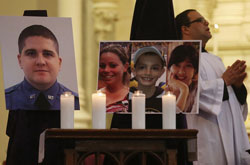The International Criminal Court (ICC) issued an arrest warrant for Russian President Vladimir Putin and Russian Children’s Rights Commissioner Maria Alekseyevna, on Friday, Mach 17. The arrest warrant claims that Putin and Alekseyevna are allegedly responsible for the deportation of Ukrainian children in occupied Ukrainian territory, a violation of the Rome Statute.
The warrant alleges that there is reason to believe that both Putin and Alekseyevna bear personal responsibility for the crimes, and that they were committed directly, in partnership with others, or through the use of other Russian officials as intermediaries.
The Rome Statute is the treaty responsible for the foundation of the International Criminal Court. It is recognized by 193 countries who are signatories to the statute. The United States, the Russian Federation, and the People’s Republic of China are notable exceptions to the treaty and do not recognize the court.
In 2018, former President Donald Trump reaffirmed to the United Nations General Assembly that the United States “will provide no support or recognition to the International Criminal Court. As far as America is concerned, the ICC has no jurisdiction, no legitimacy, and no authority.”
Despite this statement by Trump and the US still not being a signatory to the statute, President Joe Biden, while speaking to the press on Friday, said “I think it’s justified…I think it makes a very strong point,” adding that Putin “clearly committed war crimes” in his war against Ukraine.
On Thursday, Jan. 5, Biden signed the Justice for Victims of War Crimes Act, which grants the Justice Department the ability to prosecute alleged war criminals physically present in the United States. In April, Biden also called for Putin to be prosecuted over the actions of the Russian military in Ukraine.
Just two weeks ago, the Pentagon refused to provide evidence of potential Russian war crimes to the ICC due to concerns that it could set a new precedent for prosecuting American soldiers and officials for their roles in alleged war crimes in the wars in Iraq and Afghanistan.
As it stands, Putin and Alekseyevna are two of 52 individuals publicly indicted in the ICC. A senior political science student said that “this is a watershed moment for international law…potentially one of the biggest moments since the Nuremberg Trials. A leader the likes of Russian President Putin hasn’t been tried since that period. To me, it is clear that Russia is pursuing genocidal policies in Ukraine, and I see this decision as reinforcing international laws and norms against genocide and ethnic cleansing.”
There have been various reactions to the indictment. Ukrainian President Volodymyr Zelensky described the warrant as a “historic decision which will lead to historic accountability.” Russian opposition figures cheered the decision to the press, but also made it clear that it’s currently unrealistic to expect Putin’s immediate or near-term arrest.
European countries overwhelmingly supported the decision of the ICC. However, Hungary blocked the European Union (EU) from making a joint statement concerning the international arrest warrant.
Kremlin spokesman Dmitry Peskov, while speaking to the media, said that “Russia found the very questions raised by the ICC outrageous and unacceptable.” He also noted that Russia does not recognize the ICC and refused to clarify if Putin would still travel to countries which recognize the court.
Former Russian President Dmitry Medvedev stated to the press that the ICC’s judges should “look carefully to the sky,” a seeming threat to use Russian long-range weapons against the court’s location in the Dutch city of The Hague.
The Russian Foreign Ministry defended the Russian actions, saying in a public statement “who would have thought fifteen years ago that in the West taking care of children, saving them and helping them would become a criminal offense.”
A sophomore communications student said, “the decision is one to applaud. Holding war criminals accountable should be a top priority for the world to ensure we’re all safe and the horrors of genocide never happen again.”
Amidst the ICC ruling, Chinese President Xi Jinping, recently elected to an unprecedented third term as head of the Chinese Communist Party, arrived in Moscow on Monday for a discussion between the two leaders. In the past, Xi Jinping has described Putin as a close and intimate friend. The move is one of many current Chinese diplomatic actions, including a brokered deal between Iran and Saudi Arabia to restore previously fractured international ties.
By and large, the decision of the ICC to issue the arrest warrant was met with overwhelming support, especially in the West. However, it has not yet been disclosed how the ICC plans to prosecute Putin and Alekseyevna.


